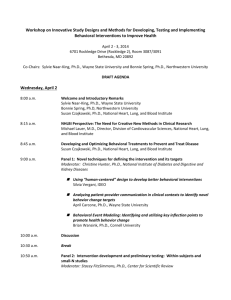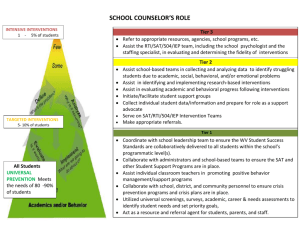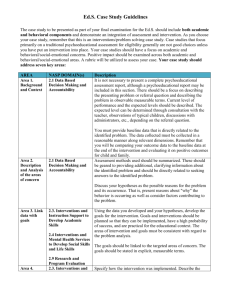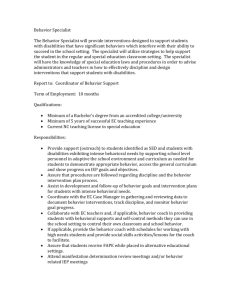Innovative Methods for Behavioral Interventions
advertisement
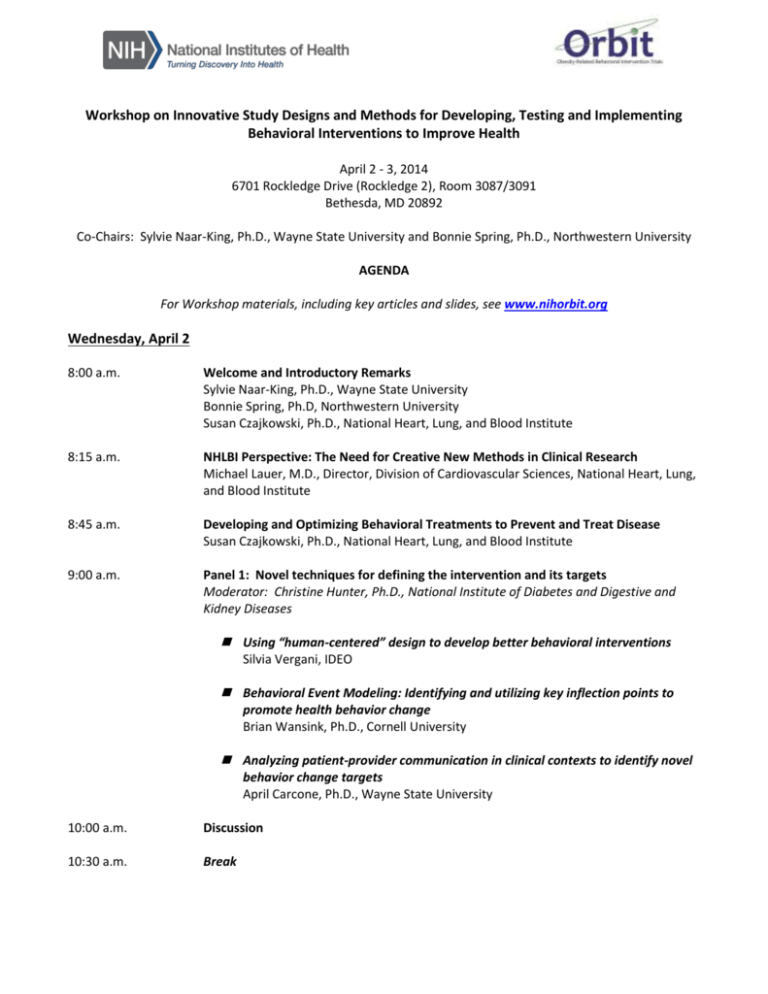
Workshop on Innovative Study Designs and Methods for Developing, Testing and Implementing Behavioral Interventions to Improve Health April 2 - 3, 2014 6701 Rockledge Drive (Rockledge 2), Room 3087/3091 Bethesda, MD 20892 Co-Chairs: Sylvie Naar-King, Ph.D., Wayne State University and Bonnie Spring, Ph.D., Northwestern University AGENDA For Workshop materials, including key articles and slides, see www.nihorbit.org Wednesday, April 2 8:00 a.m. Welcome and Introductory Remarks Sylvie Naar-King, Ph.D., Wayne State University Bonnie Spring, Ph.D, Northwestern University Susan Czajkowski, Ph.D., National Heart, Lung, and Blood Institute 8:15 a.m. NHLBI Perspective: The Need for Creative New Methods in Clinical Research Michael Lauer, M.D., Director, Division of Cardiovascular Sciences, National Heart, Lung, and Blood Institute 8:45 a.m. Developing and Optimizing Behavioral Treatments to Prevent and Treat Disease Susan Czajkowski, Ph.D., National Heart, Lung, and Blood Institute 9:00 a.m. Panel 1: Novel techniques for defining the intervention and its targets Moderator: Christine Hunter, Ph.D., National Institute of Diabetes and Digestive and Kidney Diseases Using “human-centered” design to develop better behavioral interventions Silvia Vergani, IDEO Behavioral Event Modeling: Identifying and utilizing key inflection points to promote health behavior change Brian Wansink, Ph.D., Cornell University Analyzing patient-provider communication in clinical contexts to identify novel behavior change targets April Carcone, Ph.D., Wayne State University 10:00 a.m. Discussion 10:30 a.m. Break 10:50 a.m. Panel 2: Intervention development and preliminary testing: Within-subjects and small-N studies Moderator: Stacey FitzSimmons, Ph.D., Center for Scientific Review Single-case experimental designs Bethany Raiff, Ph.D., Rowan University Modeling individual trajectories: Subject specific coding for population parameter estimates of treatment effects Thomas Templin, Ph.D., Wayne State University Three techniques for rigorous analysis of intensive within-person experiments Ty Ridenour, Ph.D., Research Triangle Institute 11:50 p.m. Discussion 12:20 p.m. LUNCH 1:20 p.m. Panel 3: Study designs for refining, tailoring and optimizing interventions I Moderator: Laura Lee Johnson, Ph.D., National Center for Complementary and Alternative Medicine The Multiphase Optimization Strategy (MOST): A new approach to building effective and efficient behavioral interventions Kari Kugler, Ph.D., The Pennsylvania State University Bayesian estimation for dose-finding studies Yuan Ji, Ph.D., University of Chicago 2:00 p.m. Discussion 2:30 p.m. Break 2:50 p.m. Panel 4: Study designs for refining, tailoring and optimizing interventions II Moderator: William Riley, Ph.D., National Cancer Institute Adaptive Interventions: From SMART to Just-in-Time Adaptive Interventions (JITAI) Inbal (Billie) Nahum-Shani, Ph.D., University of Michigan Designing user-centered just-in-time adaptive interventions Pedja Klasnja, Ph.D., University of Michigan Personalizing behavioral interventions using mobile sensing Tanzeem Choudhury, Ph.D., Cornell University Application of JITAI to substance abuse research David Gustafson, Ph.D., University of Wisconsin at Madison 4:10 p.m. Discussion 4:40 p.m. Developing and optimizing behavioral interventions: Commentary and additional considerations Moderator: Robert Kaplan, Ph.D., Director, NIH Office of Behavioral and Social Sciences Research Mario Stylianou, Ph.D, National Heart, Lung, and Blood Institute Bonnie Spring, Ph.D., Northwestern University 5:30 p.m. Adjourn for the day Thursday, April 3 8:15 a.m. Summary of Day 1 and Introduction to Day 2 Bonnie Spring, Ph.D., Northwestern University Sylvie Naar-King, Ph.D., Wayne State University Kate Stoney, Ph.D., National Heart, Lung, and Blood Institute 8:30 a.m. The NIH Office of Disease Prevention: Encouraging Innovative and Improved Approaches to Prevention Science David Murray, Ph.D., Director, NIH Office of Disease Prevention 9:00 a.m. Behavioral Intervention Research: From Efficacy to Implementation Kate Stoney, Ph.D., NHLBI 9:15 a.m. Panel 5: Innovative approaches to improve the reach, delivery and impact of behavioral interventions Moderator: Patricia Mabry, Ph.D., NIH Office of Disease Prevention The application of social network analysis to health behavior interventions Douglas Luke, Ph.D., Washington University in St. Louis Complex systems modeling for behavioral research Ross Hammond, Ph.D., Brookings Institution Harnessing “small data” for personalized health promotion Deborah Estrin, Ph.D., Cornell NYC Tech 10:15 p.m. Discussion 11:00 p.m. LUNCH 12:00 p.m. Panel 6: Harnessing existing resources to test and implement behavioral interventions Moderator: Wendy Weber, N.D., Ph.D., M.P.H., National Center for Complementary and Alternative Medicine Conducting multifaceted behavioral pragmatic trials within integrated health care systems Lynn DeBar, Ph.D., Kaiser Permanente Center for Health Research Leveraging EHR’s in large simple trials of behavioral interventions Elsie Taveras, M.D., Mass General Hospital for Children Partnering with industry in the testing and implementation of behavioral interventions: Lessons from the Hopkins-Healthways collaboration Janelle Coughlin, Ph.D., John Hopkins School of Medicine 1:00 p.m. Discussion 1:30 p.m. Testing and implementing behavioral interventions: Commentary and additional considerations Moderator: Peter Kaufmann, Ph.D., National Heart, Lung, and Blood Institute Ken Kleinman, Ph.D., Harvard Medical School Sylvie Naar-King, Ph.D., Wayne State University 2:20 p.m. Summary and Wrap-up Bonnie Spring, Ph.D. and Sylvie Naar-King, Ph.D. 2:30 p.m. Adjourn
